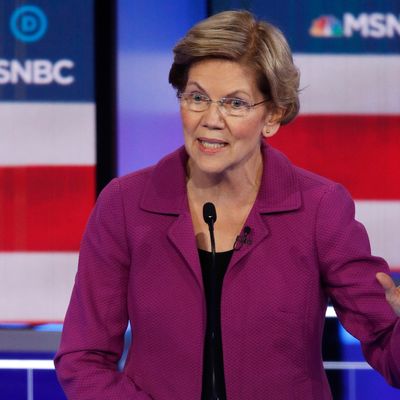
Those who expected Michael Bloomberg’s debut on the Democratic debate stage to inspire fireworks were not disappointed on Wednesday night. I spoke with national political correspondent Gabriel Debenedetti about the ex-mayor’s uneven performance, and other key takeaways from a pugilistic evening in Las Vegas.
Ben: Well, that was by far the most exciting and combative Democratic debate of this primary. There’s a lot to digest, but one thing it seems everyone agrees on is that Elizabeth Warren had a hell of a night. In going after Bloomberg mercilessly — and extremely effectively — it sure felt like she was trying to salvage her candidacy. Could it be enough to put her back into contention?
Gabriel: Warren had a clear plan, and she executed it. After the last debate, she said she wished she had fought her way into the center of the conversation more, and she definitely did that this time. Her campaign team was tweeting that they were raising massive amounts of money as it was going, and she obviously sees an opportunity to gain voters in the Buttigieg/Klobuchar (i.e., non-Bernie, non-Bloomberg, maybe non-Biden) camps. There was always a chance she could come in a strong third in Nevada. That could definitely happen now.
Ben: Meanwhile, Mike Bloomberg seemed to have a disastrous night, seeming at times unprepared for the barrage of attacks coming his way, and looking like someone who hadn’t debated in ten years, which he hasn’t. But of course he does have hundreds of millions of dollars to play around with, and social media tends to inflate the importance of these events. Could the damage not be as bad as it looked? And was it a mistake for him to even show up?
Gabriel: Obviously debates haven’t always had the effect with voters that we’ve expected, as we’ve detailed in this space repeatedly. And the other candidates who’ve benefited from this fact don’t have $60 billion to play with. But! There’s a reason this could be more than just a standard bad performance — for many voters, this was likely the first time they saw Mike Bloomberg in any capacity at all other than his ads, and there were some brutal moments.
Ben: Which did you think was the worst for him?
Gabriel: The exchanges over the NDAs and the opening moment where Warren ripped into him stand out, but the fact that there are a lot to choose from tells you something …
Ben: This feels like a repeat of a question I asked consistently after previous debates, but with a different name attached: Why didn’t anyone really go after the front-runner? Over the summer and fall, Biden was leading every poll, and other candidates seemed to expect that he’d self-destruct, which he kind of has. Now, Bernie Sanders is leading every poll, with the key difference that people have already voted in two states, and Sanders is poised to win Nevada and amass a huge delegate lead on Super Tuesday in just two weeks. Yet it often felt like only Pete Buttigieg was going after the senator directly, mostly for being (in Buttigieg’s eyes) divisive and unrealistic about his plans. What gives?
Gabriel: A few different things here. One, everyone saw a much clearer imperative to take down Bloomberg, immediately. Two, no one has yet come up with a surefire way to hit Sanders, and they clearly don’t think now is the time to experiment with new tactics. But a third part is everyone is looking for different things right now. Warren, for example, clearly doesn’t think she’s going to win over Sanders-leaning voters by attacking him, and instead sees a chance to win other wavering Democrats. Klobuchar seemed more interested in taking down Buttigieg, who is clearly standing in her political path. And so on.
Ben: So this seems like just about the ideal scenario for Bernie, right?
Gabriel: He clearly isn’t going to be too upset! He’s still on track for a win in Nevada, a potentially stronger-than-initially-expected showing in South Carolina, and maybe a real delegate coming lead out of Super Tuesday that will be hard for his opponents to chip away at if they don’t figure out a way to slow him soon.
Ben: What did you make of the question at the end, where all the candidates except Sanders said that whomever had a plurality of delegates going into the convention should win? Obviously, it’s in everyone but his interest to say that at this point …
Gabriel: I just keep thinking back to 2016, when Sanders’s campaign and its supporters were adamant that Hillary Clinton would not be the nominee until she surpassed the technical threshold with pledged delegates. In part he was objecting to the then-role of superdelegates, but this is still a flip, which he wasn’t pressed on. It could portend a messy next few months, but I don’t want to outright predict that yet.
Ben: There’s been a lot of talk about how tame this primary has been compared to, say, 2008. This debate certainly wasn’t tame. Do you think the candidates really tearing each other like this is a boon to President Trump or is this just the role these things are actually supposed to play?
Gabriel: Every time I hear this take I think I’ve gone insane and that I just dreamed, or imagined, the outrageous 2016 GOP debates, and the whole primary. Trump won after all that.
Ben: Well, I did black that out …
Gabriel: Ha, but actually as I reported this week, this is a point Barack Obama has even been making: that Democrats need to stop worrying about how messy their primary might get, because ’08 was wild and he still won.
Ben: The more pressing matter for the “Establishment,” such as there is one, is probably Bernie’s dominance, not the messiness.





























